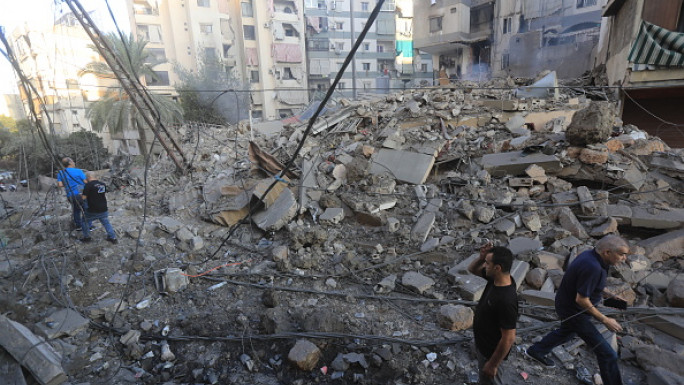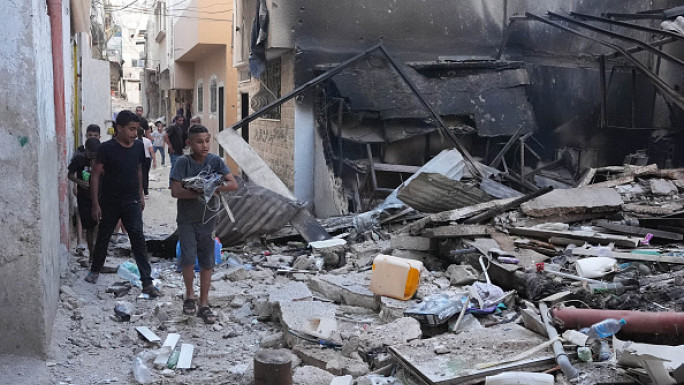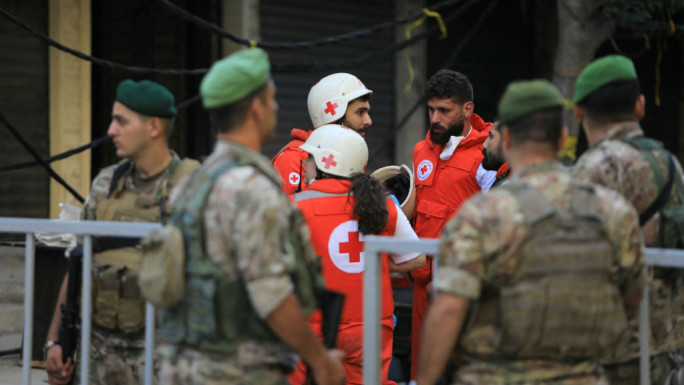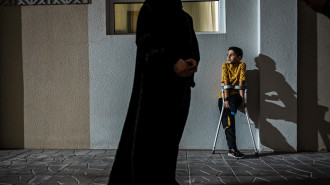Gaza's displaced live a life of waiting and dream of returning as Israel's war passes one year
Hana Al-Hamami, 52 years old, sits next to the radio for long hours, hoping to hear news of a ceasefire agreement in the Gaza Strip.
Nearby, her husband Jamil Al-Hamami was busy repairing holes in their worn-out tent in preparation for the winter and did not seem interested in listening to the radio.
The Al-Hamami family lives in a tent in the Deir al-Balah camp in the central Gaza Strip, after being forcibly displaced from their home in Gaza City at the beginning of Israel's war.
After a full year has passed since Israel's genocidal war on the Gaza Strip began, displaced Palestinians are still clinging to the ropes of hope of returning to the northern Gaza Strip, but with the drums of war beating in the direction of the Lebanese state, the displaced have lost hope of returning anytime soon.
The Palestinian Ministry of Health in the Gaza Strip announced on 30 September 2023 that the death toll from the Israeli aggression on the Strip had risen to 41,615 and 96,359 injuries since 7 October 2023.
The United Nations estimates that the number of internally displaced persons (IDPs) inside the Gaza Strip has reached 1.9 million people, out of a total population of 2.3 million. In other words, nine out of every 10 people in Gaza are now displaced.
"I did not expect that we would commemorate the first anniversary of the war while we were still displaced," Al-Hamami told The New Arab. "I cannot imagine how the world remained silent for so long about our terrible suffering in these harsh tents."
Al-Hamami feels great regret for carrying out the Israeli army's orders for the residents of Gaza City to move south last October.
"During the months of war, my family was displaced more than 11 times. Each time, we were fleeing the bombing, or looking for better places in terms of living needs and water availability," she says.
Despite this, Al-Hamami holds on to great hope of returning soon to her home in Gaza City. "We have no choice but to hold on to hope and continue to refuse the continuation of this suffering. We must not accept a new catastrophe for our people," she remarked.
Here, her husband, Jamil, interrupted her and said, "This hope has become a distant dream."
Jamil expects this war to extend for another year as the Israeli army begins its ground invasion of southern Lebanon.
Commenting on this news, he added, "The Israeli army is lying to the Lebanese, just as it lied to us when it announced that its ground invasion of Gaza would be limited. Now, there is no place that the army has not invaded."
Endless queues
In displacement camps, standing in queues has become an integral part of the lives of the displaced, to the point that the queues have become like timelines, in which waiting passes very slowly. There are queues to get water, queues to get bread, and even queues to use the toilet.
Abdul Qader Farwana, 38 years old, told TNA that sometimes he is forced to stand in a queue or reserve a turn in order to relieve himself.
Farwana, who lives in a tent inside a shelter camp east of Deir al-Balah in the central Gaza Strip, explained that his camp includes 62 people, and all of them have only one bathroom with one toilet.
"Life in tents lacks privacy. Everyone here sees you and hears your voice, even if you whisper to your wife," he said.
Farwana does not believe that Israel's war on Gaza will end soon, and said, "Unfortunately, the world has failed to stop this ongoing genocide against us. We feel that we are stuck here forever."
In a shelter camp in Mawasi Khan Yunis, south of the Gaza Strip, the displaced heard a loud scream from Mrs Farida Sultan, 34 years old, from inside her tent, so they rushed to help her.
Sultan was shouting at the top of her voice, "Save me... there is a big snake."
The woman's husband, with the help of men in the camp, was able to surround the tent, capture the snake, and kill it, as it was lying inside a box in which the family put its food supplies.
"This is not the first time I have seen dangerous reptiles inside my tent. Before that, I found a scorpion under the pillow of my four-year-old child," Sultan told TNA.
She explained that the displaced people in the shelter camps are facing an invasion of dangerous reptiles and rats, adding, "There is no way to die that the Palestinians have not experienced. Isn't everything that happened to us in terms of killing, displacement and destruction enough?"
The reason for the spread of reptiles and insects is the accumulation of waste around the tents of the displaced people, in addition to the overflow of sewage water that finds its way to the sea, causing serious environmental pollution on its shores.
Omar Matar, Director of the Health and Environment Department in the Khan Yunis Municipality, the largest governorate in the Gaza Strip, said to TNA that the accumulation of waste and the spread of sewage water between the tents "is a slow death that is killing the lives of the displaced people."
He explained that about 300,000 tons of waste are piling up in various areas between the southern Gaza Valley and the city of Khan Younis in the southern Gaza Strip, which exacerbates the catastrophic health and environmental conditions.
Matar further elaborated that the municipalities of the strip are unable to deal with these environmental problems due to the great destruction that has befallen their vehicles and sewage networks as a result of the ongoing Israeli bombardment.
Extreme poverty
On the economic level, the displaced found themselves, after a year of war, besieged by a stifling economic crisis, after losing their jobs and businesses that were their only source of income, to find themselves unemployed and facing a harsh and unforgiving reality.
As the days passed, these displaced people were forced to send their children to work in the markets in order to provide for their livelihood, even if it was at the expense of their innocent childhood.
In the Nuseirat camp in the central Gaza Strip, Lamis Shaheen, 41 years old, displaced from northern Gaza, was forced to sell her gold jewellery that she had kept since her marriage, and she even sold most of her clothes in order to buy food for her five children whose father was killed by the Israeli army last November.
Shaheen told TNA, "I never imagined that I would see my eldest son, who is no more than twelve years old, carrying boxes of goods on his thin shoulders in the market, but we no longer have any other choice."
"We are trying to stand firm and fight here with one hope, that we will return to our homes one day, but this hope has diminished greatly with the start of the Israeli ground invasion of southern Lebanon," she added.
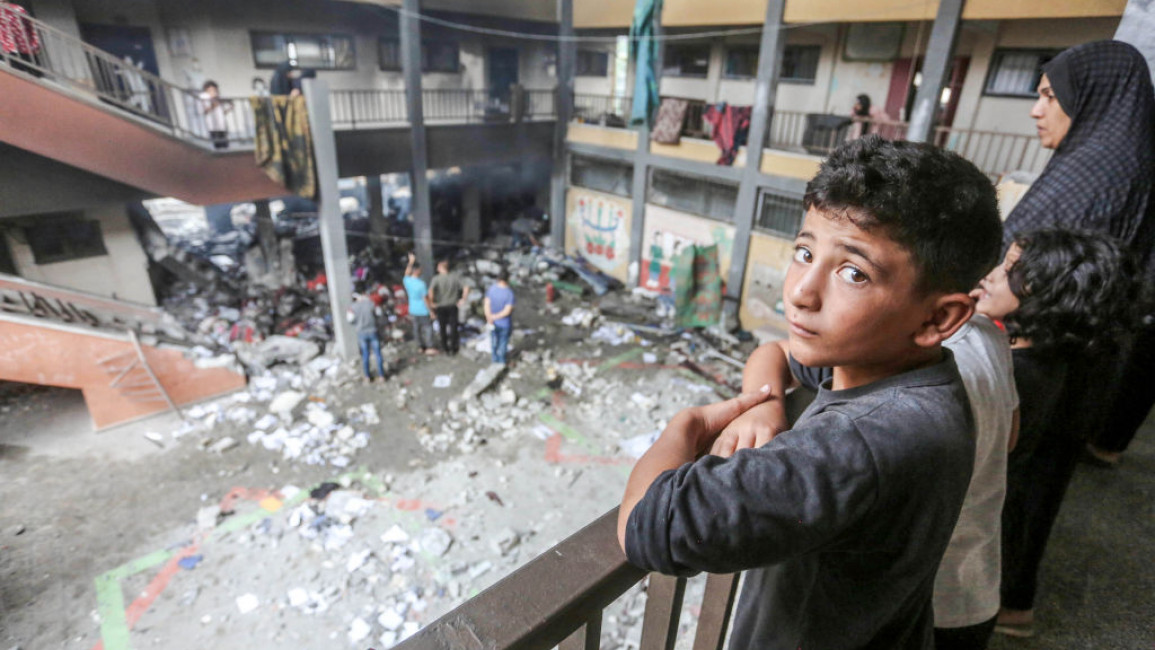
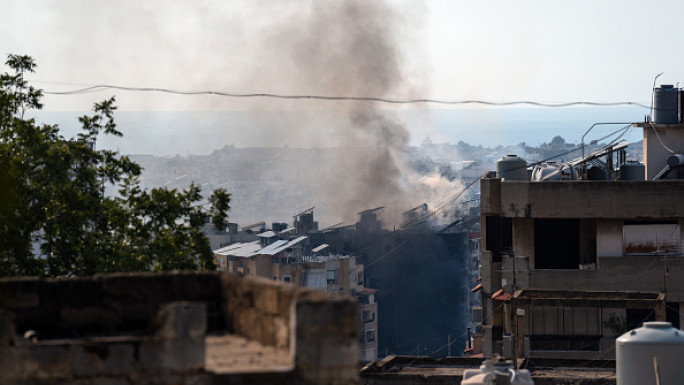
![Minnesota Tim Walz is working to court Muslim voters. [Getty]](/sites/default/files/styles/image_684x385/public/2169747529.jpeg?h=a5f2f23a&itok=b63Wif2V)
